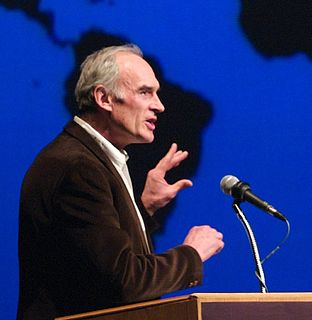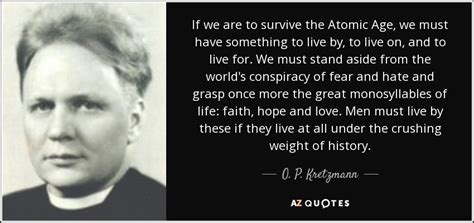A Quote by Ronald Wright
If civilization is to survive, it must live on the interest, not the capital, of nature.
Quote Topics
Related Quotes
Even in this place one can survive, and therefore one must want to survive, to tell the story, to bear witness; and that to survive we must force ourselves to save at least the skeleton, the scaffolding, the form of civilization. We are slaves, deprived of every right, exposed to every insult, condemned to certain death, but we still possess one power, and we must defend it with all our strength for it is the last — the power to refuse our consent.
If surface water can be compared with interest income, and non-renewable groundwater with capital, then much of the West was living mainly on interest income. California was milking interest and capital in about equal proportion. The plains states, however, were devouring capital as a gang of spendthrift heirs might squander a great capitalist's fortune.
If we are to survive the Atomic Age, we must have something to live by, to live on, and to live for. We must stand aside from the world's conspiracy of fear and hate and grasp once more the great monosyllables of life: faith, hope and love. Men must live by these if they live at all under the crushing weight of history.
It's a curious thing, this thing we call civilization...we think it is an affair of epochs, and nations. It's really an affair of individuals. One brother will be civilized and the other a barbarian...All civilization comes through literature now, especially in our country. A Greek got his civilization by talking and looking, and in some measure a Parisian may still do it. But we, who live remote from history and monuments, we must read or we must barbarise.
When the veil of fiction was rent, man shuddered before "Nature, red in tooth and claw." Nature had always been that and always will be, and the hands of man, even when he fashions and defends the noblest civilization, must forever be bloody hands, for this is a world in which only the strong and resolute nations survive, while the weak, especially the morally weak, who babble about brotherhood and peace, are biologically degenerate and doomed to extinction.
Nations are reorienting toward the national interest and away from Malthusianism and neoliberalism, which is good for nuclear and bad for renewables. The evidence is overwhelming that our high-energy civilization is better for people and nature than the low-energy civilization that climate alarmists would return us to.
People who think of themselves as tough-minded and realistic, among them influential political leaders and businessmen as well as go-getters and hustlers of smaller caliber, tend to take it for granted that human nature is selfish and that life is a struggle in which only the fittest may survive. According to this philosophy, the basic law by which man must live, in spite of his surface veneer of civilization, is the law of the jungle. The "fittest" are those who can bring to the struggle superior force, superior cunning, and superior ruthlessness.
Remember that accumulated knowledge, like accumulated capital, increases at compound interest: but it differs from the accumulation of capital in this; that the increase of knowledge produces a more rapid rate of progress, whilst the accumulation of capital leads to a lower rate of interest. Capital thus checks it own accumulation: knowledge thus accelerates its own advance. Each generation, therefore, to deserve comparison with its predecessor, is bound to add much more largely to the common stock than that which it immediately succeeds.



































